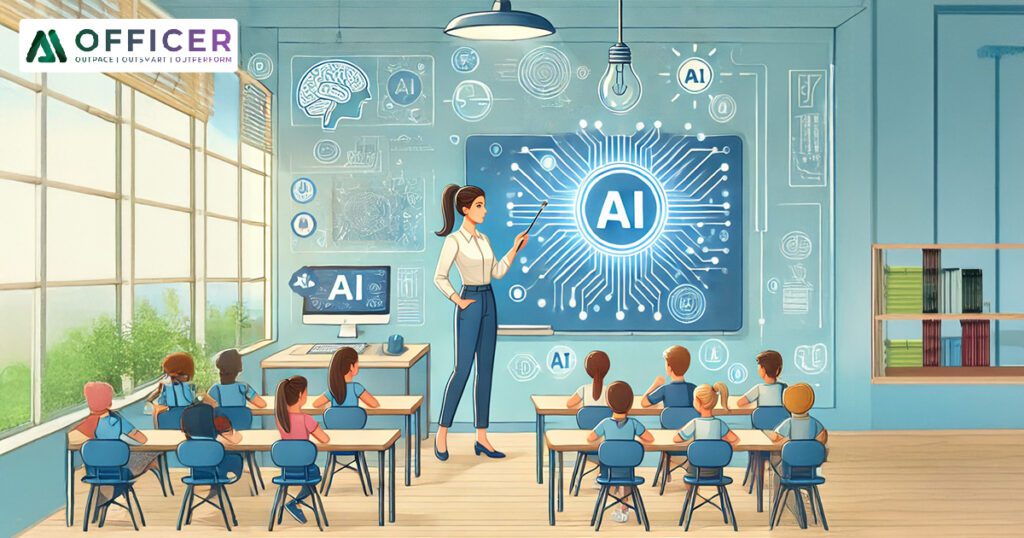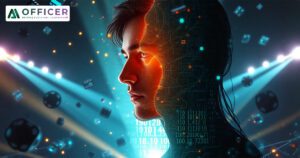
Educators worldwide are buzzing with excitement as AI redefines the teaching experience.
A whopping 93% of teachers believe that AI will revolutionize their classrooms and it’s easy to see why. [source] From automating mundane tasks like grading to providing personalized feedback instantly, AI is turning traditional teaching on its head. In fact, AI isn’t just a tool anymore—it’s becoming an integral part of modern education.
BUT WHY HAS THIS TECHNOLOGY CAPTURED THE ATTENTION OF EDUCATORS EVERYWHERE?
Because it’s delivering what teachers have been craving : efficiency, creativity and the ability to truly engage students on an individual level.
The potential here isn’t just for tech enthusiasts—it’s for every educator who wants to elevate their teaching experience. Read on to discover why AI is becoming a game-changer for classrooms across the globe.
In 2024, Education is standing at the crossroads of innovation and tradition and AI is steering the way forward. With advancements in AI-powered tools, teaching methods are being transformed, creating an environment where teachers can focus more on what truly matters : engaging with students and enhancing the learning experience.
1. AI AUTOMATES MUNDANE TASKS
Grading, attendance tracking, generating assessments—these repetitive tasks take up a significant portion of teachers’ time.
AI can now automate these processes, saving educators countless hours. According to a survey by Digii, 40.1% of educators are already using AI to generate assessments, while 28.4% rely on it for tracking attendance. By automating these mundane tasks, teachers can redirect their energy toward more interactive and personalized teaching approaches.
2. PERSONALIZED LEARNING AT SCALE
One of the most powerful aspects of AI in education is its ability to deliver personalized learning experiences. Every student learns at their own pace, and tailoring lessons for each individual has always been a challenge. However, AI has the capability to analyze student performance data, identify learning patterns, and offer customized resources that suit each learner’s needs. This results in a more engaging and effective educational experience.
For example, AI-driven platforms like Carnegie Learning are helping educators provide personalized tutoring to students, adapting lessons to match their progress in real time. This kind of AI support enables teachers to reach every student on an individual level without the overwhelming workload that traditional methods would require.
3. INSTANT, MEANINGFUL FEEDBACK
Feedback is critical for student growth, but providing timely, individualized feedback is one of the most time-consuming aspects of teaching. AI tools are changing that. Today, 22.5% of educators use AI to generate feedback instantly. These systems analyze student work, identify areas for improvement and provide actionable suggestions—all in real-time.
AI-driven platforms such as Grammarly and Turnitin not only detect grammar and plagiarism but also offer deeper insights into student writing, helping educators guide their students more effectively. The ability to provide instant, meaningful feedback is a game-changer for teachers and students alike.
AI isn’t just a theoretical concept—it’s already making a significant impact in classrooms across the world.
HERE ARE SOME CONCRETE EXAMPLES OF HOW AI IS BEING USED IN EDUCATION TODAY
1. AI-POWERED TUTORING SYSTEMS
AI tutoring systems like Squirrel AI and Third Space Learning are offering on-demand, personalized tutoring sessions. These platforms analyze student performance and adapt lessons to fit their learning pace and style. This ensures that students get the support they need when they need it, without having to wait for one-on-one teacher availability.
2. CONTENT CREATION AND LESSON PLANNING
More than 70% of educators who use AI employ it to create content. Tools like Knewton and Coursera use AI to suggest course materials, generate quizzes and even develop entire lesson plans based on learning objectives. This streamlines the planning process, allowing teachers to focus on refining and delivering their lessons rather than spending hours creating materials from scratch.
3. AUTOMATED ADMINISTRATIVE TASKS
At universities like VIT Bangalore and The Apollo University, AI is helping to manage administrative tasks, from monitoring student attendance to evaluating assignments. With AI handling these tasks, educators are free to engage more deeply with students, focusing on creative teaching rather than paperwork.
WHILE AI’S POTENTIAL IN EDUCATION IS ENORMOUS, IT’S NOT WITHOUT ITS CHALLENGES.
SOME OF THE KEY OBSTACLES INCLUDE –
1. TEACHER TRAINING
A significant portion of educators, while enthusiastic about AI, may not have the necessary training to effectively implement AI tools in their teaching. While 93% of educators are interested in using AI, a substantial number are still in the early stages of training and adoption. Ensuring that teachers are equipped with the skills and understanding to leverage AI tools is crucial for success.
2. DATA PRIVACY AND SECURITY
With AI tools collecting vast amounts of student data, concerns about privacy and data security are at the forefront. Schools and educational institutions must ensure that student data is safeguarded and used ethically, complying with regulations like GDPR and COPPA.
3. EQUITY IN ACCESS
Not all schools and students have equal access to AI tools. In many underfunded schools, access to the technology required to implement AI in the classroom is still a challenge. Bridging this digital divide is essential to ensure that AI doesn’t widen the gap between different socio – economic groups in education.
SO HOW IS AI THE FUTURE OF TEACHING?
The numbers speak for themselves. As of 2024, a growing number of educators are not just experimenting with AI but embracing it as an essential part of their teaching toolkit. Here’s why AI will continue to play a pivotal role in the future of education.
- Efficiency : By automating routine tasks, AI allows educators to focus on more impactful aspects of teaching, such as student engagement and creative lesson delivery.
- Personalization : AI enables personalized learning on a large scale, ensuring that each student receives the attention they need, at their own pace.
- Scalability : AI tools can be scaled to serve large numbers of students without compromising on the quality of education.
- Innovation : AI is continually evolving, offering new ways to make learning more interactive, engaging and effective.
At AI Officer, we understand the transformative power of AI in education. We provide customized AI solutions designed to help educators and institutions integrate AI into their teaching practices seamlessly. From AI-driven tutoring systems to advanced content creation tools, we offer solutions that empower teachers and enhance the learning experience for students.
Our team of EDU AI HUB – an e-learning platform offering curated courses for teachers and students, ensuring they are up to date with the latest AI tools & solutions, works closely with educational institutions to develop tailored strategies that maximize the benefits of AI while addressing specific challenges such as data privacy and teacher training.
Reach out now for a consultation and let us show you how AI can enhance your educational journey.
Don’t just witness the future of education—be a part of it with AI Officer.





